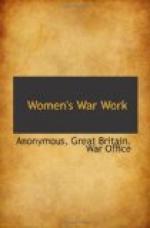Women supervisors and examiners are trained at Woolwich, and the first of these were found by “Women’s Service,” and we find women control and manage large numbers of women in the big works extremely well. One girl of twenty-three, the daughter of a famous engineer, is controlling the work of 6,000 women who are working on submarines, guns, aircraft, and all manner of munitions.
One great engineer who believes in women and women’s future in engineering has started what we might term an engineering college for women.
He has built a model factory away in the hills “somewhere in Scotland” with four tiers of ferro-cement floors. It is built with the idea of taking 300 women students and eight months after it opened, it had sixty women students. It is a factory entirely for women, run by, and to a large extent managed by women, with the exception of two men instructors. In the ground floor the girls are working at parts of high power aeroplane engines, under their works superintendent, a woman who took her Mathematical Tripos at Newnham College, and was lecturer at one of our girls’ public schools. The women rank as engineer apprentices and their hours are forty-four a week. The first six months are probationary with pay at 20/- ($5) a week, and the students are doing extremely well.
“Women are now part and parcel of our great army,” said the Earl of Derby, on July 13, 1916, “without them it would be impossible for progress to be made, but with them I believe victory can be assured.”
[Illustration: Rough turning Jacket forging of 6-Pounder, Hotchkiss gun]
Mr. Asquith, too, has paid his tribute to the woman munition maker and to others who are doing men’s work. In a memorable speech on the Second Reading of the Special Register Bill, he admitted that the women of this country have rendered as effective service in the prosecution of the war as any other class of the community. “It is true they cannot fight in the gross material sense of going out with rifles and so forth, but they fill our munition factories, they are doing the work which the men who are fighting had to perform before, they have taken their places, they are the servants of the State and they have aided in the most effective way in the prosecution of the war.”
Our munition women are in the shipyards, the engineering shops, the aeroplane sheds, the shell shops, flocking in thousands into the cities, leaving homes and friends to work in the munition cities we have built since the war. When our great arsenals and factories empty, women pour out in thousands. Night and day they have worked as the men have and it has been no easy or light task. We know that still more will be demanded of us, but we think, as our four million men do, that these things are well worth doing for the freedom of the souls of the nations.
In the munition factories that feeling and conviction burns like a flame and the enemy who thinks to demoralize our men and our women by bombing our homes and our workshops finds the workers, men and women, only made more determined.




